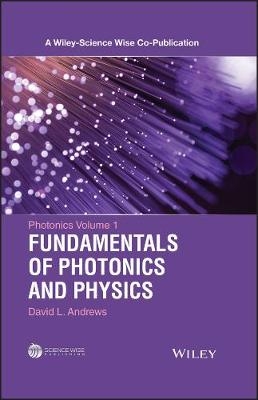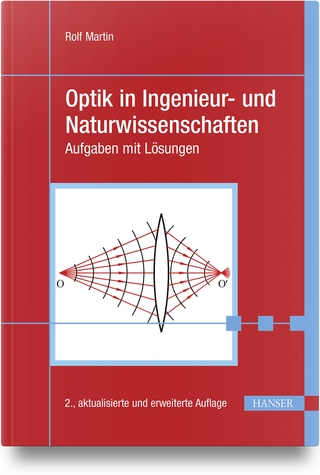
Photonics, Volume 1
John Wiley & Sons Inc (Verlag)
978-1-118-22553-0 (ISBN)
Covers modern photonics accessibly and discusses the basic physical principles underlying all the applications and technology of photonics.
This volume covers the basic physical principles underlying the technology and all applications of photonics from statistical optics to quantum optics. The topics discussed in this volume are: Photons in perspective; Coherence and Statistical Optics; Complex Light and Singular Optics; Electrodynamics of Dielectric Media; Fast and slow Light; Holography; Multiphoton Processes; Optical Angular Momentum; Optical Forces, Trapping and Manipulation; Polarization States; Quantum Electrodynamics; Quantum Information and Computing; Quantum Optics; Resonance Energy Transfer; Surface Optics; Ultrafast Pulse Phenomena.
Comprehensive and accessible coverage of the whole of modern photonics
Emphasizes processes and applications that specifically exploit photon attributes of light
Deals with the rapidly advancing area of modern optics
Chapters are written by top scientists in their field
Written for the graduate level student in physical sciences; Industrial and academic researchers in photonics, graduate students in the area; College lecturers, educators, policymakers, consultants, Scientific and technical libraries, government laboratories, NIH.
DAVID L. ANDREWS leads research on fundamental molecular photonics and energy transport, optomechanical forces, and nonlinear optical phenomena. He has over 300 research papers and a dozen of books to his nameincluding the widely adopted textbook, Lasers in Chemistry. The current focus of his research group is on optical vortices, novel mechanisms for optical nanomanipulation and switching, and light harvesting in nanostructured molecular systems. The group enjoys strong international links, particularly with groups in Canada, Lithuania, New Zealand, and the United States. Andrews is a Fellow of the Royal Society of Chemistry, a Fellow of the Institute of Physics, and a Fellow of SPIE, the international society for optics and photonics.
List of Contributors xi
Preface xiii
1 A Photon in Perspective 1
David L. Andrews
1.1 Introduction 1
1.2 Foundations 3
1.3 Medium Issues 8
1.4 Photon Localization and Wavefunction 10
1.5 The Quantum Vacuum and Virtual Photons 12
1.6 Structured Light 15
1.7 Photon Number Fluctuations and Phase 18
1.8 The Reality of Photonics 20
Acknowledgments 20
References 20
2 Coherence and Statistical Optics 27
Mayukh Lahiri
2.1 Introduction 27
2.2 Classical Theory of Optical Coherence in the Space-Time Domain 28
2.3 Classical Theory of Optical Coherence in the Space-Frequency Domain 34
2.4 Cross-Spectrally Pure Optical Fields 38
2.5 Polarization Properties of Stochastic Beams 43
2.6 Remarks on Partially Coherent and Partially Polarized Beams 51
2.7 Basics of Quantum Theory of Optical Coherence 52
2.8 Concluding Remarks 55
Acknowledgments 56
References 56
3 Light Beams with Spatially Variable Polarization 61
Enrique J. Galvez
3.1 Introduction 61
3.2 Poincare Modes of Beams 62
3.3 Experimental Approaches 69
3.4 Polarization Singularities 70
3.5 Conclusion 73
Acknowledgments 73
References 73
4 Quantum Optics 77
Howard Carmichael
4.1 Introduction 77
4.2 Fundamentals 78
4.3 Open Systems: Inputs and Outputs 87
4.4 Photon Counting 95
4.5 Cavity and Circuit QED 105
References, 111
5 Squeezed Light 121
A. I. Lvovsky
5.1 What is Squeezed Light? 121
5.2 Salient Features of Squeezed States 128
5.3 Detection 136
5.4 Preparation 141
5.5 Applications in Quantum Information 148
5.6 Applications in Quantum Metrology 154
5.7 Conclusion and Outlook 157
References 158
6 Electromagnetic Theory of Materials 165
Tom G. Mackay
6.1 Preamble 165
6.2 Macroscopic Viewpoint 166
6.3 Constitutive Dyadics 171
6.4 Linear Materials 178
6.5 Nonlinear Materials 194
6.6 Closing Remarks 198
References 199
7 Surface and Cavity Nanophotonics 205
Mohamed Babiker
7.1 Introduction 205
7.2 Basic Formalism 207
7.3 Dipole Emitter Near Edge 211
7.4 Quantum Correlations 215
7.5 Entanglement 217
7.6 Wedge Cavities 219
7.7 Conclusions 223
Acknowledgments 225
References 225
8 Quantum Electrodynamics 229
A. Salam
8.1 Introduction 229
8.2 Molecular QED: Principle of Minimal Electromagnetic Coupling 231
8.3 Multipolar Hamiltonian 235
8.4 One-Photon Absorption 241
8.5 Emission of Light: Spontaneous and Stimulated Processes 244
8.6 Linear Light-Scattering: The Kramers–Heisenberg Dispersion Formula 246
8.7 Chiroptical Effects 251
8.8 Two-Photon Absorption 255
8.9 Nonlinear Light-Scattering: Sum-Frequency and Harmonic Generation 258
8.10 Resonance Energy Transfer 261
8.11 van der Waals Dispersion Energy 264
8.12 Radiation-Induced Interparticle Forces 266
8.13 Summary and Outlook 269
References 271
9 Multiphoton Processes 279
Angus J. Bain
9.1 Introduction 279
9.2 Molecular Two-Photon Absorption: Basic Principles 282
9.3 Molecular Two-Photon Fluorescence 289
9.4 Applications and Future Prospects 307
9.5 Conclusions 309
Acknowledgments 311
References 311
10 Orbital Angular Momentum 321
Emma Wisniewski-Barker and Miles J. Padgett
10.1 Historical Introduction 321
10.2 Creating Beams with OAM 324
10.3 Micro-Manipulation through the Use of OAM 327
10.4 Beam Transformations 329
10.5 Measuring Beams with OAM 332
10.6 OAM in Classical Imaging 333
10.7 OAM in Nonlinear and Quantum Optics 333
10.8 Conclusions 335
References 335
11 Introduction to Helicity and Electromagnetic Duality Transformations in Optics 341
Ivan Fernandez-Corbaton and Gabriel Molina-Terriza
11.1 Introduction 341
11.2 Symmetries and Operators 342
11.3 Electromagnetic Duality 344
11.4 Optical Helicity and Electromagnetic Duality Symmetry 346
11.5 Duality Symmetry in Piecewise Homogeneous and Isotropic Media 347
11.6 Applications of the Framework 351
11.7 Conclusions 359
References 360
12 Slow and Fast Light 363
Robert W. Boyd and Zhimin Shi
12.1 Introduction 363
12.2 Mechanisms of Slow Light 364
12.3 Physics with Slow and Fast Light 367
12.4 Some Applications of Slow and Fast Light 374
12.5 Fundamental Limits on Slow Light 379
References 381
13 Attosecond Physics: Attosecond Streaking Spectroscopy of Atoms and Solids 387
Uwe Thumm, Qing Liao, Elisabeth M. Bothschafter, Frederik Sußmann, Matthias F. Kling, and Reinhard Kienberger
13.1 Introduction 387
13.2 Time-Resolved Photoemission from Atoms 393
13.3 Streaked Photoemission from Solids 407
13.4 Attosecond Streaking from Nanostructures 425
13.5 Conclusions 432
Acknowledgments 434
References 434
Index 443
| Reihe/Serie | A Wiley-Science Wise Co-Publication |
|---|---|
| Verlagsort | New York |
| Sprache | englisch |
| Maße | 163 x 244 mm |
| Gewicht | 785 g |
| Themenwelt | Naturwissenschaften ► Physik / Astronomie ► Optik |
| Technik ► Elektrotechnik / Energietechnik | |
| ISBN-10 | 1-118-22553-8 / 1118225538 |
| ISBN-13 | 978-1-118-22553-0 / 9781118225530 |
| Zustand | Neuware |
| Informationen gemäß Produktsicherheitsverordnung (GPSR) | |
| Haben Sie eine Frage zum Produkt? |
aus dem Bereich


